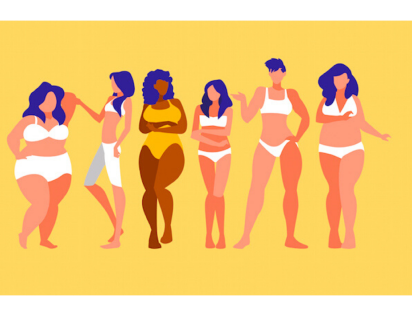Discover the wonders of the human body, from anatomy and development to sexual identity.
This simply refers to the perception and feelings about your body and your physical appearance. Your physical appearance is determined by heredity (i.e. genetic traits passed down by your biological parents👴🧓 – that’s why you look like them!), your environment which includes weather conditions, the type of meals available and your health habits.
The human body comes in many shapes, colours and sizes and the beautiful part is that every human body is special and unique, and you should feel good about your body.
Most times, you see different body images on the internet📱, billboards, media etc. and they often project unrealistic and idolised body images, however, your physical appearance does not determine your worth as a human being and understanding your body image can help you to feel better about your own body.
Why should you know about body image?
Having a positive body image gives you a sense of comfort with your own body and this is an important part of self-esteem. It also helps you to understand and appreciate the differences in individual body images without feeling inferior or superior to others.

There are certain things that can contribute to your perception of your body and physical appearance either positively or negatively. Some of them are:
Any person with a negative body image may —
People’s perceptions about physical appearance differs and they can change over time and vary between cultures. Sometimes people worry about some aspect of their physical appearance that others do not notice or find appealing.
Your feelings about your body can affect your health, self- image and behaviour. As a result of the cultural and gendered stereotypes against body image, people especially females suffer from various disorders such as anorexia (an eating disorder that causes people to obsess over weight and what they eat characterised by an abnormally low body weight), bulimia (also an eating disorder characterised by overeating followed by induced vomiting or misuse of laxatives) or even depression connected to their body image.
Some people engage in other practices such as use of diet pills, steroids, drugs💊 and bleaching cream to change their physical appearance, these things are only temporary and may pose negative consequences to the overall health of such people. Do not let your self-esteem be influenced by other people, don’t let anyone take away your self respect, accept yourself the way you are and seek help if you think you have a negative body image.
This simply refers to how you feel about yourself. It affects your behaviour and the decisions you make. Self esteem can be high, i.e. you value yourself highly or low i.e. you consistently doubt yourself.
People with high self-esteem acknowledge their successes and achievements, respond confidently to challenges, and practise positive thinking. They are generally satisfied with who they are and what they are doing with their lives while people with low self-esteem feel inadequate, helpless, inferior and unable to improve their life situations.
How can you develop your self-esteem?
In order to feel good about yourself, you can enhance your self-esteem by doing the following
We use cookies to improve your experience on our site. By using our site, you consent to cookies.
Manage your cookie preferences below:
Essential cookies enable basic functions and are necessary for the proper function of the website.
These cookies are needed for adding comments on this website.
Statistics cookies collect information anonymously. This information helps us understand how visitors use our website.
Google Analytics is a powerful tool that tracks and analyzes website traffic for informed marketing decisions.
Service URL: policies.google.com (opens in a new window)